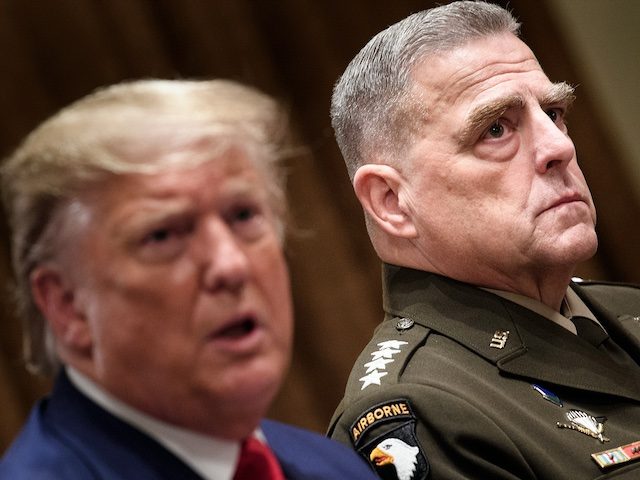 |
| Whose judgment would you trust more after Jan. 6? |
The story is all over the Internet, hyping Bob Woodward's latest epic tell-all.
A sampling -
Breitbart's version (source of the image).
Marco Rubio seeks getting his name wedged into widespread reporting. Rubio is not alone in attention mongering. Many at the time were urging Pence to invoke the 25th Amendment, which Pence suitably declined to consider.
Was it a coup? Reporting is Milley and Pelosi consulted and were in agreement that the situation required extraordinary attention, as Trump's behavior at the time was extraordinary and troubling.
So - was it a coup?
....................................................
If a coup, was it justified by Jan. 6? Might reliance on Jan. 6 be an afterthought?
Recall, Nixon and Haig. [update - Haig then moving to become NATO commander.]
Recall in this Milley reportedly communicated with Pelosi. Their consensus, should it matter, and should the fact there was Jan 6, legislative leadership reaching to make a military liaison first, consensus reportedly quickly emerging, only then action? Was and when was notice given each of the four leaders of the two houses' Intelligence Committees?
Check the reporting. Is the above sequence being what is reported, are some questions being fudged, or is there error in the above understanding of timings.
_______FURTHER UPDATE_______
Guardian publishes and op-ed arguing for dismissal on a claim of insubordination, though there was not a coup in the sense of a multi-person plan with coordinated actions, (at least not having that appearance per publications online, so far).
Neither the joint-chiefs collectively, nor chair of the joint-chiefs runs the military.
The president is commander in chief of the military, operating in general through the office of the Secretary of Defense as a secondary civilian commander.
It is fundamental history. Those writing the Constitution had, among them, some with strong opinion against the new federal nation having a standing army. Feelings varied. The Second Amendment's use of "militia" is consistent with NOT having a standing army, but instead relying on an armed populace that when needed could be called up to serve. (How we have changed! War costs a lot with some profiting from war, with present budgeting shows a mighty costly and big tail wagging the dog.) In turn, during the Washington presidency the Whiskey Rebellion showed a popular uprising being put down by force. Was the rebellion quelled in a military sense, or in a police power sense? It was not an action at arms against a different nation, but within national territory not yet granted statehood. That suggests policing against rebellion, not a war.
Last, if not calling any Iranians, who else did Milley call besides China's top general, and if there were other calls, what was the substance of any/all conversations? It begs investigation. So far, investigation is facing a stone wall.
However, bottom line, as present commander in chief, Biden has the position and discretionary authority to not remove Milley. To not discipline him in any way and to retain him at rank and as chair of the joint chiefs. I.e., to keep him where he is. Whether that is a good or bad idea is a separate question from Biden holding the power and decision.
At no time during the Trump presidency was the 26th Amendment invoked, and if invoked power would have divested to the Vice President, not to high ranking uniformed military officials. (Although some publicly suggested it, the 26th Amendment was never put into play at any time during Trump's single term.)
